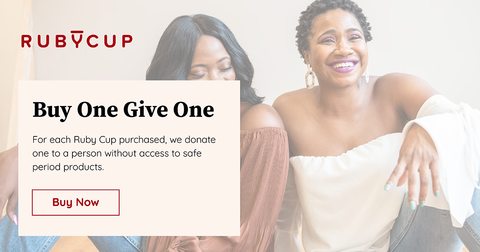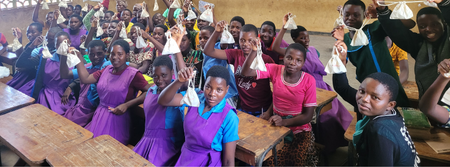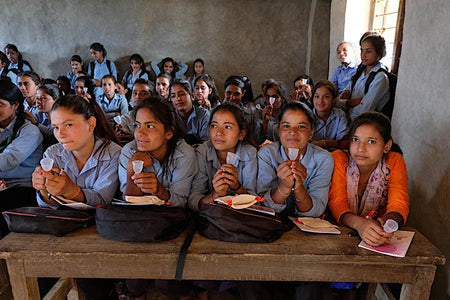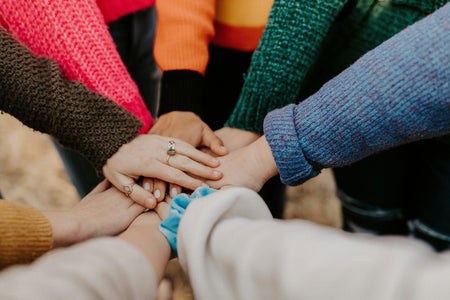"What's in a name?"
When Shakespeare claimed that if you called a rose anything else it would smell just as sweet, we knew his insight could never apply to periods.
You know why? Because this study by period-tracking app Clue discovered over 5,000 euphemisms for the word "period". Creating code names for something that half of the population experiences on a monthly basis points to something amiss around the world.
It's called period stigma. Period stigma can be caused by a lack of information around the topic, cultural norms, and societal socialization patterns. The shame put upon people who menstruate can cause physical, mental and emotional health issues and we've decided that enough is enough.
Period stigma can come in many forms including:
- Myths around menstruation
- Lack of knowledge and education about periods
- Period shaming & poverty in the school environment
- Exclusion from everyday activities
- "Pink tax"
Education about periods and understanding the taboos around menstruation can help fight the stigma and create a more equal society where people aren't shamed for what their bodies do.
With every Ruby Cup you purchase, you donate another one to someone without access to safe menstrual products. Make a difference in someone’s life and shop Ruby Cup now.
Period poverty and stigma
From Milwaukee to Mumbai, period poverty affects people all over the world - not just in countries where poverty is prevalent. Period poverty is the lack of access to safe menstrual products as well as a lack of education around menstruation. It also includes the lack of infrastructure involved with water, sanitation and hygiene (WASH).
Dealing with bleeding isn't the only expense when it comes to a period. There are other discomforts like menstrual cramps, nausea, backache, headache and diarrhea. Treatments to deal with these symptoms, like painkillers, may be too expensive or unavailable in more rural areas in developing countries.
In many low and middle-income countries, the cost of period products is much higher when compared to how much people are earning. When people can't afford store-bought products to deal with menstruation, they resort to home remedies like using toilet paper, old cloths, or even mud and dry leaves. In extreme situations, there are also those that engage in transactional sex in order to afford menstrual products.
In cases where people in these settings can afford safe menstrual products, sometimes they use them for longer than advised, which can cause infection and in the most severe cases toxic shock syndrome (TSS). The lack of handwashing stations and soap can also lead to infection while the unavailability of toilets with locks on the doors can lead to harassment or abusive situations.
Aside from these physical barriers when dealing with menstruation, the mental and emotional strains that arise from a lack of education can create stigmas and taboos. From a young age, people who menstruate are usually taught that the topic is something to be secretive about. In the State of the Period study by the popular period underwear brand Thinx 64% of students said they believe society teaches people to be ashamed of their periods. While period stigma and shame can cause negative mental health impacts, so too can the stress of being unable to afford menstrual products.

Discrimination and exclusion from society because of period myths
Just as a positive cycle perpetuates more positivity and growth, a negative cycle can have a similar effect but in the opposite way. The worse the stigma and myths around periods are, the harder we have to fight to break the cycle.
In Nepal the centuries-old tradition of Chhaupadi (even though it's been banned) is still practiced in some rural areas. The tradition is that when someone is on their period, they’re sent to a shed or hut because they’re considered impure and even unlucky. Although it's not as common anymore, the idea of impurity continues to exist. When a woman is nauchune meaning "untouchable", she's not allowed to cook, touch other people, or pray. It's similar in Bangladesh where girls and women on their periods are also excluded from these activities.
Around India, there are also many myths related to menstruation. The main restrictions in rural areas are not being able to enter the puja room which is the most sacred part of the house used for worship, and not entering the kitchen. In another study, women claimed that the smell coming from their bodies during menstruation could turn preserved food bad and consequently aren't allowed to touch sour foods like pickles. In some cultures, women bury the cloths they use instead of pads so they can't be used by evil spirits. The myths even go as far as to suggest that period blood is dangerous, or if a person menstruating touches a cow, it will become infertile.
These myths can be dispelled with basic science. Societies need education about menstruation so that these hurtful ideas disappear and allow people with periods more dignity.
Lack of support in the school environment
It doesn't matter where you go to school, young people who menstruate can't necessarily escape the period stigma anywhere.
A study in the US found that 67% of students aged 13-19 years have missed out on school because they didn't have the period products they needed. In Canada, 63% of those surveyed said they had to regularly or occasionally miss out on an activity because of their period. In a study of 600 adolescent girls in Delhi, India, 40% were absent from school during their periods.
The absenteeism of girls in school can have a compound effect, especially for those young people in developing countries. When they miss school, they are more likely to drop out, which then causes them to find a low-level job or take charge of unpaid work around the home.
When people who menstruate do have access to menstrual products and are able to attend classes, there's a higher chance for them to participate in society culturally, economically and politically. In recent years there have been changes to legislation surrounding menstruation and gender equality issues. This is in part thanks to the diversification of political parties and the inclusion of minorities. When these people understand the struggles that they themselves experience, they can bring up these needs and in turn fight for more fairness.
The fight to battle period stigma and poverty is also the fight for gender equality. When everyone has safe access to a freer period, we create a virtuous cycle that continues to push for justice and fairness for everyone, no matter their circumstances.

Education on menstruation to fight period stigma and taboos
The less we know about a topic, the more we jump to conclusions or make up stories about why things are the way they are. It's a cycle that, with some work, can be broken. In many low or middle-income countries, like the ones we make donations to and partner with, the education around menstruation is minimal.
The study we mentioned earlier on adolescent girls in Delhi found that most of the girls got their information from their mothers. They concluded that the mothers should therefore be counseled to free themselves of taboos and discuss menstruation openly. They also suggested that the school's curriculum should include more information about menstruation.
Perhaps because of existing taboos around periods, it's easy to assume that the education on menstruation is in short supply in India. In Bangladesh, for example, a national hygiene survey discovered that between 36 and 42% of adolescents knew or heard about menstruation at the time of menarche. But even in developed countries like the United States or Canada, young people are expressing the same concerns about what they're learning at school.
In Plan International Canada's study, 19% said they felt somewhat not confident and 31% said they were not confident that they knew what to do when their period first arrived. Meanwhile in the US, in a study done on the lack of communication and education on menstrual periods, 40% of teens said they were confused and unprepared for their first period. Again, this could have to do with the quality of the education they're receiving. If 42% of the students said the health teacher appeared uncomfortable discussing menstruation, how does this affect the students' own feelings?
Even now, in high-income, developed countries, we aren't offering young people who menstruate basic education about the human body and what to expect at the time of their first period. The more we speak openly about and teach menstruation as something normal in everyday life, the sooner we'll get to break the taboos.

The "pink tax"
Pink tax - or gender tax - refers to the price of products aimed toward women being higher than a similar product marketed toward men. You might have noticed this phenomenon with products such as razors, deodorant, clothing, uniforms, even dry cleaning!
A study done by the New York City Department of Consumer Affairs in 2015 analyzed 35 product categories. In all but 5 of them, "products for female consumers were priced higher than those for male consumers". They found that products marketed toward women cost more 42% of the time while this only applies to 18% of the time for men.
So what about one of the most essential products that people who menstruate have to buy about once every 28 (give or take) days? In many states across the US, a "tampon tax" still exists. You can blame it on the stigma and shame that people usually are taught to feel about their periods, but it's still unfair. Especially when some other named "essentials" for men have received the green light for tax exemptions. For example in the state of Wisconsin in the United States, products deemed "essentials" such as condoms and erectile dysfunction treatments like Viagra are tax exempt, while tampons and other menstrual products aren't.
Similarly, Lawyer, VP for Brennen School of Justice at NYU School of Law and co-founder of Period Equity Jennifer Weiss-Wolf, went through tax codes in every state in the US and found some very surprising items that were tax exempt. For example marshmallows in Florida, cooking wine in California, snowmobiles in Maine and gun club memberships in Wisconsin.
In a world where women and minorities are generally paid less than men, this "gender tax" is problematic. Since these studies have popped up, there have been petitions to ban this type of tax to allow people to experience more equality. In the US, however, 26 out of the 50 states still charge sales tax on menstrual products.
Law and policymakers need to stop treating menstrual products as a luxury. Menstrual products are a necessity and if we want to see growth and development and closing of the gender gap, we need to recognize these needs not only as valid but indispensable.

Period stigma quotes
If you're someone who menstruates, it's likely you've heard at least one comment or stigma about menstruation in your life. From friends and colleagues to family members and even in one case a politician, the stigmas surrounding periods run deep.
May 28 is officially Menstrual Hygiene Day. We, however, insist on referring to this day as Menstrual Health Day and to May as Menstrual Health Month. What better way to celebrate than with some quotes about menstruation and period pride.
"Menstruation is not a problem, poor menstrual hygiene is."
"Poor menstrual hygiene is a problem as big as polio."
"Menstrual blood is the only source of blood that is not automatically induced. Yet in modern society, this is the most hidden blood, the one so rarely spoken of and almost never seen, except privately by women."
"While women shed the blood of life on each moon at menstruation, man can only shed the blood of death through warfare and killing."
"Don’t wait for a girl to become a woman to empower them. Empower a girl’s life by giving sanitary pads to them. With pads, we give them wings."
"When women take care of their health, they become their own best friend."
Our favorite of these is the last one. Of all the stigma and shame that people who menstruate experience, the best thing we can do is to educate them on the beauty and naturalness of their bodily functions. The path to understanding and self-love is ultimately what will cause a change in the cycle so that everyone can experience period dignity and pride. Only in this way can we break the stigma.
Ruby Cup in the fight against period stigma
From the onset of launching Ruby Cup, we were determined to battle period poverty and period stigma. With the Buy One, Give One program, you're giving someone without safe access to menstrual products the opportunity to experience a freer period through Ruby Cups, educational workshops and mentorship.
We work closely with our partners to ensure that our donees receive the education they need so they can make an informed decision about whether to take a menstrual cup home to try. They're also supported by community peers and mentors that check in periodically and are available to answer any questions they may have.
Enjoy a freer, more waste-free period and make a difference in someone else's life. Shop Ruby Cup now.






